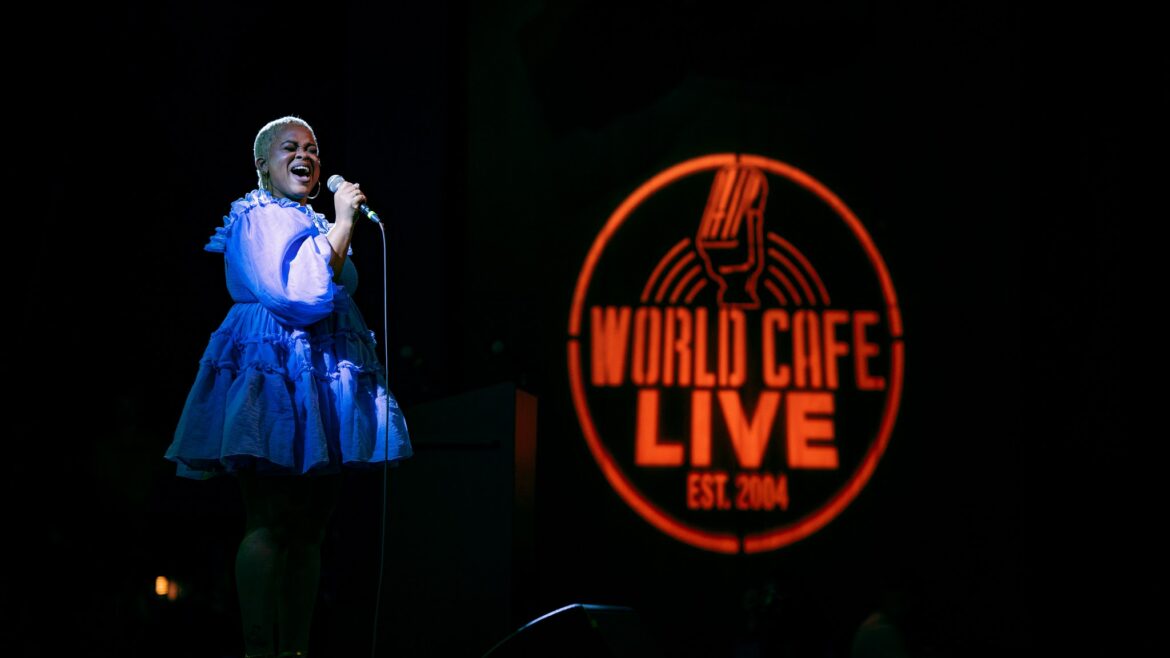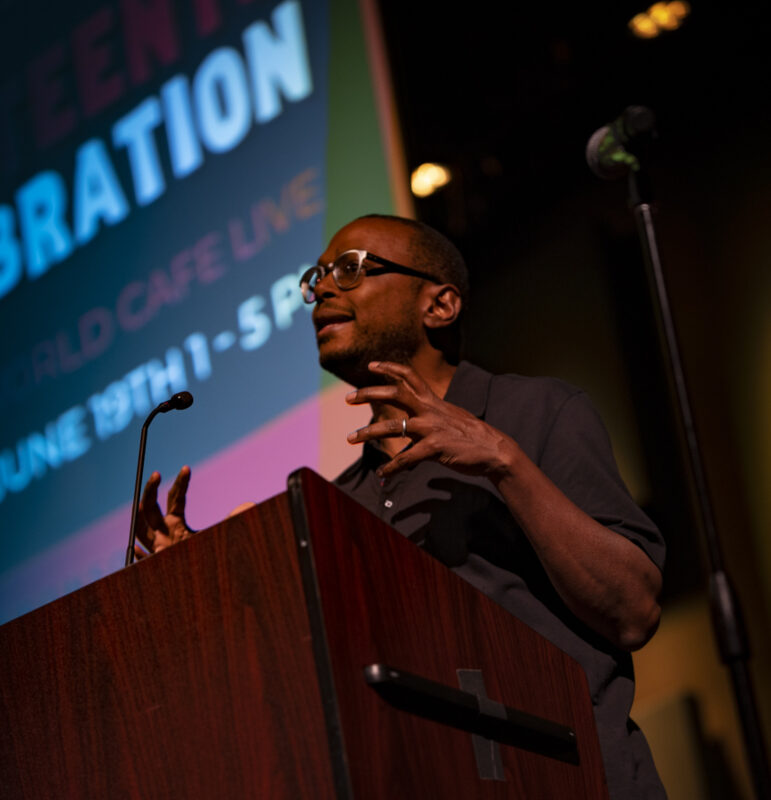Second year of Black Music City collaboration boosts support for Philadelphia artists

Victoria Wilcox
Laurin Talese, recipient of a Black Music City grant, performs at the project's Juneteenth event at World Cafe Live in Philadelphia.
A grant program facilitated by Philadelphia music stations doubled its funding for local Black artists this year, culminating in an event Sunday that showcased their reflections on the city’s artistic heritage.
Now in its second year, the Black Music City project awarded nearly $100,000 in grant money to 46 Black creatives. The event showcasing their art at World Cafe Live, the performance venue run in partnership with WXPN, received 615 RSVPs, over the maximum capacity of 600.
The project is a collaboration among WXPN, WRTI and REC Philly, an incubator and agency that provides local artists with business advice and spaces to create. At the start of the pandemic, Will Toms, co-founder and CCO of REC Philly, found that the biggest issue his clients were facing was a loss of income from in-person events. Both he and WXPN GM Roger LaMay decided that the best way to support creators was to fund their passion projects, and Black Music City was born.
“Artists have an opportunity to honor some of the rich music culture of Philadelphia and in exchange be able to receive funding to support their works.”
Will Toms, REC Philly CCO
In its first year, Black Music City awarded $48,000 in grants to 23 recipients. Applicants must outline their projects and how they will honor Philadelphia’s Black music history. The stations focus on coordinating the event and grants, while REC Philly supports its client base, according to WXPN GM Roger LaMay.
Toms co-founded REC Philly in 2015 because, as an artist himself, he saw that many artists were struggling with renting studio time and understanding the business side of their art. WXPN partnered with REC Philly from its creation and was one of its first sponsors and partners, according to LaMay.
“[REC Philly] built a significant membership of generally younger and very diverse creatives,” LaMay said. “We thought for a small or medium public radio station, it’s exactly the kind of people you want to connect to going forward and to be able to amplify their work and all that. It’s exactly who we are and what we want to do.”

WXPN shares “the same value system as we do, as far as we believe deeply in collaboration across the whole creative ecosystem in Philly, and they really put their money where their mouth is when it comes to this project,” Toms said. “… Now, it developed into this grant program where artists have an opportunity to honor some of the rich music culture of Philadelphia and in exchange be able to receive funding to support their works.”
LaMay thought to bring WRTI, which airs classical and jazz, into the project partly because jazz plays a huge role in Black music history. LaMay also wanted to model a collaboration between public radio stations, something he and WRTI GM Bill Johnson are passionate about.
“The idea of Black Music City is really essential to where we’re at right now, you know, in terms of our community and our nation’s history and narrative and the issues that we care about,” Johnson said. “It’s really giving artists an opportunity to create art that’s incredibly visible to help us digest what’s going on around us.”
Tributes to Philly soul and gospel
While the Black Music City partners do not contribute funds to the project, they solicit contributions from foundations and corporations. This year, Black Music City was sponsored by Aqua, Tito’s Handmade Vodka, the Wyncote Foundation and the City of Philadelphia Office of Arts, Culture and the Creative Economy. (Current also receives funding from the Wyncote Foundation.)
The intersection of Juneteenth and Black Music Appreciation Month, also in June, created the “perfect storm” to celebrate Philadelphia’s Black music heritage and freedom for Black Americans, Toms said.
About half of this year’s grantees presented visual art at the Sunday event, held in person for the public for the first time this year. Others performed pieces inspired by Philadelphia musicians.
Musician Zeek Burse, a two-time grant recipient, presented “La La La (The Evolution of Love).” Inspired by a hit song by the Delfonics, a Philadelphia R&B and soul group, Burse’s performance also incorporated visual elements to communicate a message about loving the earth.
The Black Music City grant helped Burse finish the project, which he had started before applying. “I’m really, really grateful that I did [apply],” Burse said. “ I believe it’ll … shine more light on just equality and knowing the earth and one another, loving nature.”
Jazz vibraphonist and grant recipient Kelsi Bolden said the Black Music City funding gave her the opportunity to advance her career while learning valuable lessons about leading a band. Bolden and her band performed “Beams of Heaven: The Sound and Legacy of Charles Albert Tindley,” a tribute to a lesser-known Philadelphia gospel composer and pioneer.
“My very specific goal, and why I’m so thankful for this project and for this grant, is to basically pioneer a new style of music, and that’s gospel vibraphone,” Bolden said. “… I believe that there should be no limitations to how gospel music is expressed.”
Johnson, Toms and LaMay all hope to continue to evolve Black Music City to offer more money and opportunities to Black artists in Philadelphia in coming years. The partners hope to increase funding to individual grantees, who currently receive between $1,000 and $3,500, according to LaMay.
“Some radio stations or some private companies don’t even want to go in on projects that are good for the community if it involves what could be perceived as a competitor,” Toms said. “So the idea that these two different radio stations are together to do this, I think, is a big deal.”





